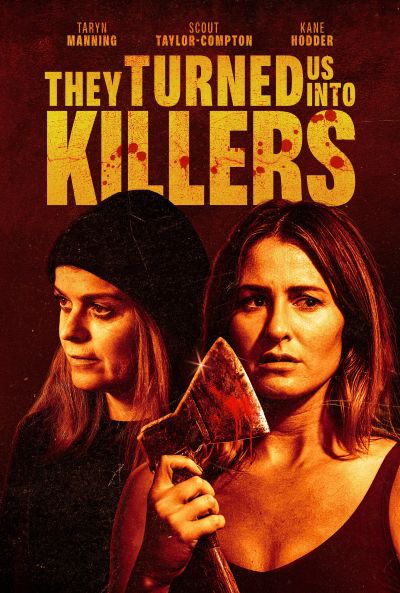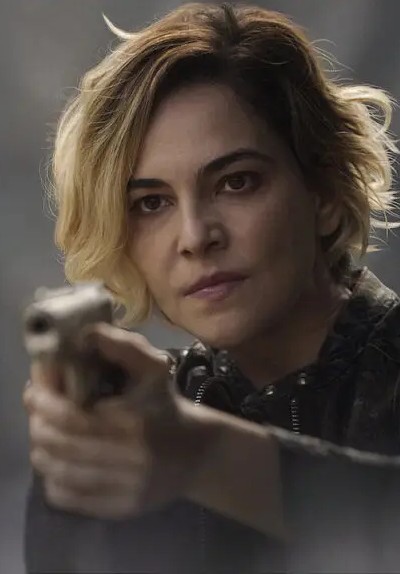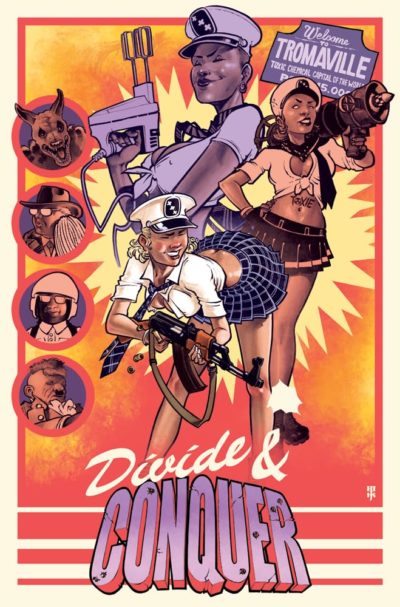★★★½
“Heathers: the seventies remix.”
 This is now the third film with the same title to be reviewed on the site: no vampires or Russian sorceresses to be found here. This does get an extra half star for genuinely surprising me. In the early stages, I had a strong feeling I knew exactly where this was going to end up going. Men bad, white people bad – and white men? Well, they’re the worst of all. Call it a spoiler perhaps – we’ll get to those – but that is definitely not how this unfolds. It takes place in 1976 Alabama, where teenager Abigail Cole (Cantrell) and her mother Eve (Lynch) have just moved from California. It’s clear this was to get away from “something”. Exactly what is unclear, but it seems to have had something to do with Abigail’s father.
This is now the third film with the same title to be reviewed on the site: no vampires or Russian sorceresses to be found here. This does get an extra half star for genuinely surprising me. In the early stages, I had a strong feeling I knew exactly where this was going to end up going. Men bad, white people bad – and white men? Well, they’re the worst of all. Call it a spoiler perhaps – we’ll get to those – but that is definitely not how this unfolds. It takes place in 1976 Alabama, where teenager Abigail Cole (Cantrell) and her mother Eve (Lynch) have just moved from California. It’s clear this was to get away from “something”. Exactly what is unclear, but it seems to have had something to do with Abigail’s father.
She makes friends with Lucas (Reed-Brown), who lives next door and is the victim of bullies at school. Initially, Abigail’s behaviour is positively heroic, defending Lucas from his tormentors. Though the film never makes mention of it, Lucas is black. You feel this might have been an issue in seventies Alabama, but the insults hurled at Lucas are entirely of the f-word rather than the n-word, an interesting choice. Anyway, Abigail proves more than capable of taking care of both of them, wielding a baseball-bat, fire extinguisher and axe-handle to good effect.
[Spoilers] However, things are entirely upended when further incidents make it abundantly clear that Abigail is not a heroic vigilante, defender of the oppressed, so much as a psychopath who revels in the opportunity to use violence against others. I did not see that coming. From this point on, just about everything is reversed, because the character for whom you’ve been rooting the entire time, is now the villainess. Conversely, the local cop, who seemed the epitome of racist law-enforcement, turns out to be sympathetic to Lucas and his apparent plight. However, things only cascade further into darkness as we continue on. The truth about Abigail’s missing father comes out, and the body count continues to increase, as efforts are made to clear up the previous corpses. [End spoilers]
There are some plot-holes here: given Abigail and Lucas were hauled into the principal’s office for an incident involving one bully, they would (Lucas particularly, even if Abigail was discounted through seventies sexism) surely be prime suspects in his subsequent disappearance. However, I am prepared to cut it some slack, due to the glorious one-eighty pulled off in the middle, which can only be applauded. Credit in particular to Cantrell’s performance: I’m sure if you go back and watch it again, you would be able to spot the clues to her personality in the earlier scenes. However, I’ve a feeling the impact would likely be less on subsequent viewings, where you know what’s coming. This is likely to be a “one and done” for me, which is why it doesn’t get a seal of approval. Albeit a highly satisfactory “one”.
Dir: Melissa Vitello
Star: Ava Cantrell, Tren Reed-Brown, Hermione Lynch, Gene Farber





 This is one of those films where the same person wrote, directed and starred in it, and once again, the results illustrate the problems with such an endeavour. Almost any project will benefit from an external perspective which can offer constructive criticism, but when this is removed, the flaws typically end up multiplied. That said, this isn’t terrible. I think Riches the screenwriter comes out best, with a story which bypasses the usual cliches of urban storylines e.g. gangster rising out of the gutter, and does offer some genuine surprises. Director Riches also gets some points for restraint on the soundtrack front; it’s not comprised entirely of her mates rapping badly.
This is one of those films where the same person wrote, directed and starred in it, and once again, the results illustrate the problems with such an endeavour. Almost any project will benefit from an external perspective which can offer constructive criticism, but when this is removed, the flaws typically end up multiplied. That said, this isn’t terrible. I think Riches the screenwriter comes out best, with a story which bypasses the usual cliches of urban storylines e.g. gangster rising out of the gutter, and does offer some genuine surprises. Director Riches also gets some points for restraint on the soundtrack front; it’s not comprised entirely of her mates rapping badly.  Well, this is a spectacular mess. Except, the word “spectacular” implies something of interest, and that’s far from anything this delivers in its boring trudge towards a predictable ending. It demonstrates the perils when you, as a film-maker, decide to take your story and fragment the timeline. This only works if the script is able to maintain coherence around the jumps back and forth. This painfully fails on that count, beginning in the middle, but then bouncing back and forth to the point you know little and care less about any of the participants, or what happens to them. How bad is it? It gets the rare honour of me starting on the review, when there’s still half an hour to go.
Well, this is a spectacular mess. Except, the word “spectacular” implies something of interest, and that’s far from anything this delivers in its boring trudge towards a predictable ending. It demonstrates the perils when you, as a film-maker, decide to take your story and fragment the timeline. This only works if the script is able to maintain coherence around the jumps back and forth. This painfully fails on that count, beginning in the middle, but then bouncing back and forth to the point you know little and care less about any of the participants, or what happens to them. How bad is it? It gets the rare honour of me starting on the review, when there’s still half an hour to go. I’ll treat these two seasons as one entity. Indeed, there’s a case to be made that you could include
I’ll treat these two seasons as one entity. Indeed, there’s a case to be made that you could include  There’s an old joke about bad movies: “This film wasn’t released, it escaped.” It seems disturbingly appropriate here, however, considering the shooting of this finished in October 2021, and it has been part of our annual previews for 2022, 2023 and 2024. Quite why Netflix sat on the end product close to three years, I don’t know. But having watched it, I can confidently say: it wasn’t long enough. This is the kind of movie that left me feeling actively more stupid by the end of it. Alba plays Parker, a soldier who returns to her hometown in rural New Mexico after her father is killed in a mile accident. Only, of course [and that whirring sound is my eyes rolling], it turns out not to be an accident.
There’s an old joke about bad movies: “This film wasn’t released, it escaped.” It seems disturbingly appropriate here, however, considering the shooting of this finished in October 2021, and it has been part of our annual previews for 2022, 2023 and 2024. Quite why Netflix sat on the end product close to three years, I don’t know. But having watched it, I can confidently say: it wasn’t long enough. This is the kind of movie that left me feeling actively more stupid by the end of it. Alba plays Parker, a soldier who returns to her hometown in rural New Mexico after her father is killed in a mile accident. Only, of course [and that whirring sound is my eyes rolling], it turns out not to be an accident. This starts off strong, with an attention grabbing scene where a woman gets a visit from a plumber. She offers him a glass of water, and… Things do not go as expected. For the woman is Jessie (Shay), a psychiatrist on a mission. She has made it her purpose in life to punish paedophiles whom she feels have been too lightly punished by the law. The man is one such, and it does not end well for him. Specifically, he is stabbed, and buried in a shallow grave, deep in the Australian outback. Safe to say the film has got my attention. Unfortunately, it’s more or less downhill all the way from here.
This starts off strong, with an attention grabbing scene where a woman gets a visit from a plumber. She offers him a glass of water, and… Things do not go as expected. For the woman is Jessie (Shay), a psychiatrist on a mission. She has made it her purpose in life to punish paedophiles whom she feels have been too lightly punished by the law. The man is one such, and it does not end well for him. Specifically, he is stabbed, and buried in a shallow grave, deep in the Australian outback. Safe to say the film has got my attention. Unfortunately, it’s more or less downhill all the way from here. If I was feeling mean, I’d have tagged this as “Pretty shitty Bang Bang”. But while undoubtedly amusing, that wouldn’t be 100% fair. For in the field of low-budget urban action heroines, this is actually better than most. Now, by broader standards, that’s still not exactly great. However, I’ve seen enough of the genre to appreciate and welcome mere technical proficiency. Simply by having decent audio, I was already impressed. It’s the story of Kiara Sommers (Nunno-Brown), a former soldier who is now a prosecuting attorney. During a meet with one of her informants, she is shot and left for dead, but rescued by another veteran, Ray Smith (Parrish) and nursed back to health. [I’ve vague memories of a Chow Yun-Fat film with this plot]
If I was feeling mean, I’d have tagged this as “Pretty shitty Bang Bang”. But while undoubtedly amusing, that wouldn’t be 100% fair. For in the field of low-budget urban action heroines, this is actually better than most. Now, by broader standards, that’s still not exactly great. However, I’ve seen enough of the genre to appreciate and welcome mere technical proficiency. Simply by having decent audio, I was already impressed. It’s the story of Kiara Sommers (Nunno-Brown), a former soldier who is now a prosecuting attorney. During a meet with one of her informants, she is shot and left for dead, but rescued by another veteran, Ray Smith (Parrish) and nursed back to health. [I’ve vague memories of a Chow Yun-Fat film with this plot] I ask, because this film, made in Mexico City and starring mostly Mexicans, seems to be trying to take place in America. It’s not doing a good job of it. The heroine is Martha (Mazarrasa), a single mother running a shop in a border American city with the help of her two daughters, Eva (Reynaud) and Raquel. Then Eva is kidnapped by evil Mexican cartel boss, El Chacal (Guerrerio), and held by him, even after Martha pays the requested ransom. However, it turns out Mom has a hidden past, which gave her a set of special skills. With the help of sympathetic cop, Juan Cinderos (Dulzaides), she sets out to bring down his organization and retrieve her daughter.
I ask, because this film, made in Mexico City and starring mostly Mexicans, seems to be trying to take place in America. It’s not doing a good job of it. The heroine is Martha (Mazarrasa), a single mother running a shop in a border American city with the help of her two daughters, Eva (Reynaud) and Raquel. Then Eva is kidnapped by evil Mexican cartel boss, El Chacal (Guerrerio), and held by him, even after Martha pays the requested ransom. However, it turns out Mom has a hidden past, which gave her a set of special skills. With the help of sympathetic cop, Juan Cinderos (Dulzaides), she sets out to bring down his organization and retrieve her daughter. There are times where I regret my choice of pastime. It means I end up watching things for this site that I would never give the time of day, given the choice. This is one such, having endured the almost physically painful experience which was
There are times where I regret my choice of pastime. It means I end up watching things for this site that I would never give the time of day, given the choice. This is one such, having endured the almost physically painful experience which was  Not to be confused with
Not to be confused with